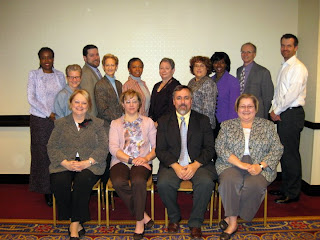
The theme for the
2011 Leadership Summit (Jan. 17-22) was "Future Ready: Building Community", although I think it might be better stated as "we are family". Information professionals and librarians from several countries gathered in Washington, DC to understand their roles as leaders in
SLA, to get updated on what's happening with the Association, and to connect with their colleagues. A quick list of highlights:
- The Board of Directors meet on Monday, Tuesday and Wednesday in both open and closed sessions. More than a dozen Association members attended the open session on Wednesday morning. Reports from a number of committees and councils were received. In the time for open comments, members asked questions and made suggestions.
- From Wednesday through Friday, 200+ SLA leaders met during the actual Summit led by the Chapter Cabinet Chair (Liz Blankson-Hemans) and Division Cabinet Chair (Mary Ellen Bates).
- At the business meeting in June 2010, members heard about the state of the Association. The economy had affected SLA as it has the organizations we all work for. Members heard about the balanced budget and expectations for 2011 from Dan Trefethen, SLA's treasurer.
- SLA's president, Cindy Romaine rolled out her theme for the year - Future Ready - and invited all of us to contribute to the Future Ready 365 blog. (You can contribute, too.)
- Daniel Lee introduced us to Operation Vitality, which will give SLA units a new web hosting service and a newly designed theme using WordPress.
- Susan Robertson from ASAE gave an information-packed keynote on why members join and volunteer in any organization. Her slides, along with slides from other presenters, will be made available to SLA members.
- People brainstormed ideas for units programs, ways of engaging more members, and methods for doing outreach to non-members during sessions and while networking.
That short list may not make you realize how full the days were...but...yes, very, very full!
We are Family: Families find ways of pulling together, sharing responsibilities, and supporting each other. During the Leadership Summit, units looked at each other and wondered how they could do the same. There were also conversations about how the units could support the Association. Any support that a unit gives the Association helps the entire organization (including that unit and its members). Discussions on that are continuing.
The theme of family could also be seen in the evening as people banded together for dinner and libations. Everyone was welcomed at the table to continue the day's topics (or whatever the topic of the moment was) and to build stronger connections. (In networking, strong connections or bonds give the relationship the ability to endure.) It was great to see that some connections had started through social media, leading to "hey...I know you..." moments. (Like
@Batty_Towers and
@iBraryGuy)
A Beginning: The Leadership Summit occurs at the beginning of the terms of service for SLA leaders. Thus it is a time for new leaders to understand what their responsibilities are and to turn to each other for support. It was wonderful to see leaders reach across and lend a helping hand. The next gathering of SLA leaders will occur in Philadelphia as part of the SLA Annual Conference in June.
 My First Board Meeting:
My First Board Meeting: At the right is a photo of the entire current
Board of Directors (save one). We are a diverse group from two continents and with a wide variety of backgrounds, job titles, professional responsibilities, etc. We are the people that have been entrusted by the membership to lead the Association and we all take that very seriously.
This was my first board meeting since joining the Board on Jan. 1. We'll meet face-to-face again at the Annual Conference and in between we will meet on monthly conference calls to keep the information flowing and to make any needed decisions. This is definitely a "working board".
Thanks to the Washington, DC chapter for their hospitality and for all of the vendors who participated in the tabletop displays or as sponsors. Yes, we do see you as partners. (
Addendum 1/25/2011: The sponsor and exhibitors at the Summit were:
Dow Jones & Company,
Proquest Dialog,
Springer,
Wolters Kluwer Health-Ovid,
ASTM,
Basch Subscriptions & Prenax Inc.,
The Reference Shelf, and
Reprints Desk.)
I didn't have much free time, so it having time to visit with
Henrik de Gyor, who does the
DAM blog and
podcast, was a luxury. It was nice to visit with someone who is also observes and comments on topics related to digital assets.
Taken by SLA staff, in the photo above are (back row from left) Liz Blankson-Hemans, Mary Ellen Bates, Richard Huffine, Ruth Wolfish, Jill Hurst-Wahl, Ann Sweeney, Sara Tompson, Nettie Seaberry, Dan Trefethen, and Daniel Lee; (front row from left) Anne Caputo, Cindy Romaine, Brent Mai and Janice Lachance. Not shown: Ulla de Stricker.
and Barnes & Noble (online), and may show up through other booksellers. (Both are currently offering pre-publication deals.)

